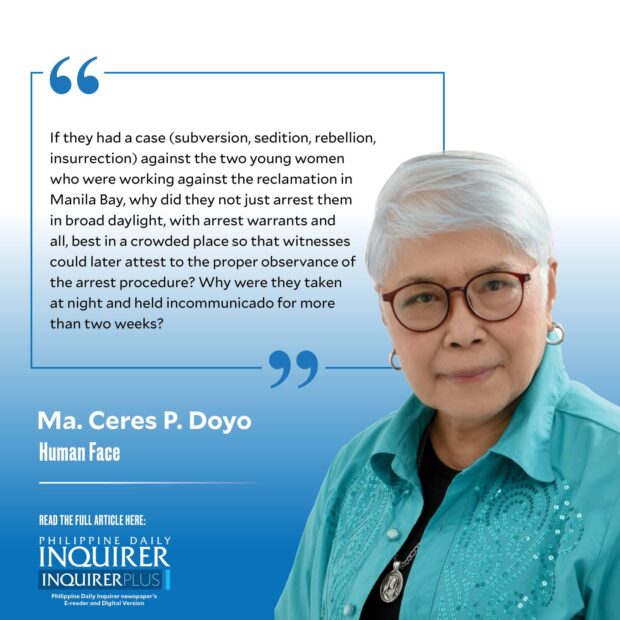Body snatchers with military ranks
Indulge me when I use the term “body snatchers.” It has a sinister, cinematic ring to it and conjures up images of participants in an evil plot. Under our criminal laws, their deed would be called kidnapping or abduction which may involve ransom. Or it could be a vengeful act or, worse, a compulsion to inflict pain as in the case of sociopaths. While the word “abduction” means seizing a person without the person’s consent and God knows what’s next, for ufologists, it has come to be associated with extraterrestrials, as in alien abduction portrayed in sci-fi movies and suggested in documentaries. But that is another story.
In the field of human rights, advocates have coined the words “enforced disappearances” and “los desaparecidos” (the disappeared) to refer to those forcibly taken by state forces and never seen again. Such was the case of countless Filipino activists who disappeared during the Marcos dictatorship (1972 to 1986), such was the case of Jonas Burgos (son of the late press freedom icon Jose Burgos Jr. and wife Edita) who disappeared in 2007 during the watch of then President Gloria Macapagal Arroyo.
So let me give an added shady nuance to the military abductors of environmental activists Jonila Castro, 21, and Jhed Tamano, 22, by calling them body snatchers. Down to the level of those harvesting body parts in crime thrillers. The handiwork of evildoers. Do I sound extra mean today or do I sound extra mean today?
If they had a case (subversion, sedition, rebellion, insurrection) against the two young women who were working against the reclamation in Manila Bay, why did they not just arrest them in broad daylight, with arrest warrants and all, best in a crowded place so that witnesses could later attest to the proper observance of the arrest procedure? Why were they taken at night and held incommunicado for more than two weeks? The question that lingered in my mind these past days was: What is the mindset of those who plotted this body snatching, uh, abduction? Why do they do it? Something there, sirs, must be expunged, exorcised, if you know what I am getting at.
Well, the body snatchers got their comeuppance when their script did not fly. After presenting Castro and Tamano as surrenderees/rebel returnees in a media conference of the National Task Force to End Local Communist Armed Conflict, the two intrepid young women presented their own version and narrated how they were abducted on Sept. 2 in Orion, Bataan. (Read the Inquirer banner story: “Activists back with kin after baring abduction,” News, 9/20/23.) The body snatchers were red-faced.
A similar fate befell development worker and teachers’ rights activist Dyan Gumanao and her fiancé Armand Dayoha of Cebu. Her abduction early this year was recorded in a video that went viral. In a Rappler video report by John Sitchon, Gumanao came out to congratulate Castro and Tamano. She is currently in Geneva, Switzerland, as a delegate to the Philippine Universal Periodic Review Watch at the 54th United Nations (UN) Human Rights Council session. There she will also present the case of Castro and Tamano. Fifteen persons have reportedly disappeared since Ferdinand R. Marcos Jr. became president in July 2022.
Incidentally, Aug. 30 is the International Day of the Victims of Enforced Disappearances. This is to raise awareness about this global crime. Enforced disappearance is “the arrest, detention, abduction, or other deprivation of liberty by agents of the State or by persons or groups of persons acting with authorization, support, or acquiescence of the State, followed by a refusal to acknowledge the deprivation of liberty or to give information on the fate or whereabouts of the disappeared persons, with the intention of removing them from the protection of the law … The date was chosen to commemorate the enforced disappearance of Jonas Burgos, a Filipino human rights activist who was abducted by State forces in 2007.” This commemorative day was proclaimed by the UN General Assembly in 2010.
I have kept my copy of the pocket-sized “Your Human Rights” published by the Civil Liberties Union of the Philippines and the Free Legal Assistance Group led by former senator and ex-political detainee Jose W. Diokno. We were supposed to have the booklet with us always during the dark years of Marcos martial rule. The first page says: “Even though we are still under martial law, in fact, you do have legal rights.” And it goes on to enumerate what one should do “in case” and “when already … ” We should make copies of this, to read to state-authorized body snatchers and night stalkers.
—————-
Send feedback to cerespd@gmail.com





















